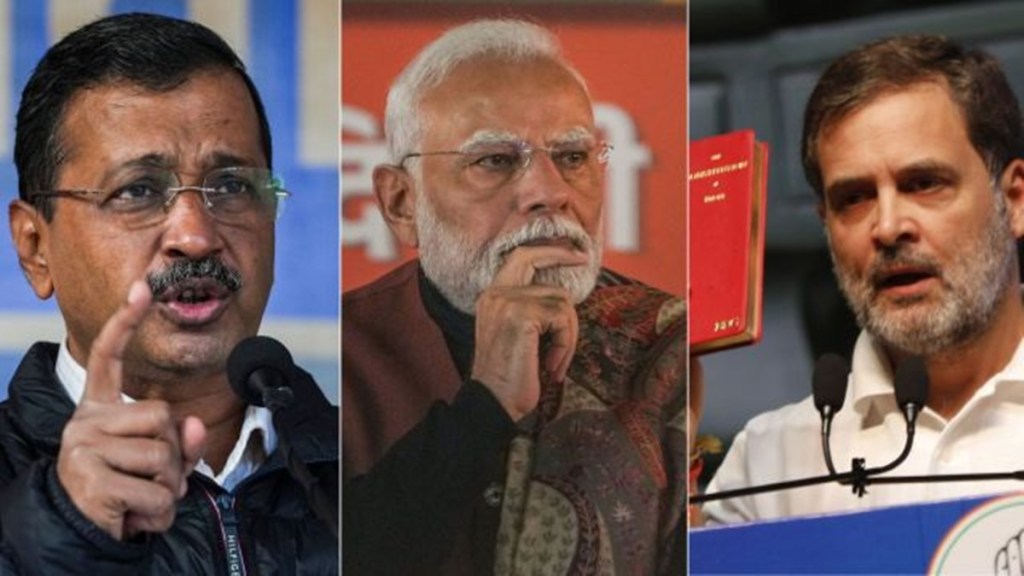The Bharatiya Janata Party (BJP) is mounting a vigorous campaign to reclaim power in Delhi after more than 26 years, focusing on its “Parivartan” (change) slogan and targeting AAP leader Arvind Kejriwal over corruption allegations.
The BJP last held power in the national capital from December 1993 to December 1998, during which it saw three chief ministers: Madan Lal Khurana, Sahib Singh Verma, and Sushma Swaraj.
The Delhi Assembly elections are set for February 5, with results to be counted on February 8. The contest is shaping up to be a tight race between the ruling Aam Aadmi Party (AAP), a resurgent BJP, and the Congress, which is aiming to recover its political footing in the city.
AAP has already announced its full slate of candidates, including Kejriwal, who is seeking re-election from the New Delhi seat, and Chief Minister Atishi, who will run in Kalkaji.
The New Delhi constituency is expected to be a key battleground, with Kejriwal facing off against Parvesh Verma, the BJP candidate and son of former Chief Minister Sahib Singh Verma, and Sandeep Dikshit, the Congress contender and son of former Chief Minister Sheila Dikshit.
BJP leaders argue that this is their best chance in years to return to power, citing corruption charges against Kejriwal, including the “Sheesh Mahal” and liquor scam controversies, as well as growing anti-incumbency sentiment against AAP.
For its part, AAP acknowledges the challenge but remains optimistic, pointing to Kejriwal’s track record of fulfilling promises and recent announcements, such as a proposed Rs 2,100 monthly honorarium for eligible women in Delhi, which the party believes will secure its victory.
Kejriwal had launched AAP’s campaign song “Phir Layenge Kejriwal”, emphasising the party’s focus on “work over abusive politics” in contrast to BJP’s negative campaigning. BJP has hit back by accusing AAP of corruption and pointing to its failures in key areas such as clean drinking water, road quality, public transportation, air pollution, and healthcare.
Both parties are also engaged in a dispute over voter lists, with AAP accusing the BJP of attempting to delete the names of AAP supporters and the BJP alleging that AAP is aiding illegal immigrants from Bangladesh and Myanmar to bolster its voter base.
Meanwhile, Congress is working to regain influence in Delhi after losing ground to AAP in recent years. The party has fielded several prominent candidates, including city president Devender Yadav in Samay Badli and Alka Lamba, national president of Mahila Congress, in Kalkaji. Congress has also rolled out a new welfare scheme for women, promising Rs 2,500 per month if the party is elected.
The BJP’s slate includes several high-profile candidates, such as former Delhi Congress President Arvinder Singh Lovely and former AAP ministers Raj Kumar Chauhan, Kailash Gahlot, and Raaj Kumar Anand, all of whom joined the party recently.
The BJP’s former South Delhi MP, Ramesh Bidhuri, is also contesting the Kalkaji seat against Kejriwal. He has already stirred controversy with remarks about Congress leader Priyanka Gandhi Vadra and Atishi.
Since its formation in 2012, AAP has grown into a dominant force in Delhi politics. In its first election, AAP secured 28 seats in the 70-member Delhi Assembly. The BJP won 32 seats, and Congress claimed 8 seats. In 2015, AAP swept the elections, winning 67 out of 70 seats with a 54.3% vote share, while BJP managed just 3 seats and Congress failed to win a single seat.
AAP’s dominance continued in 2020, when it again won 62 seats, with a 53.6% vote share. The BJP improved its tally to 8 seats, while Congress once again was left with no representation in the assembly.

